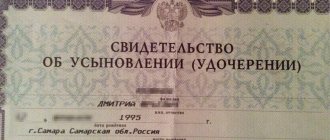An application for re-issuance of a certificate of paternity is written if you have lost the first one or for other reasons. An application to the registry office for the re-issuance of a paternity certificate can be sent by email; for this you need to find out the email address of the registry office. For a clear example, I will give you archived blog entries to help you: Applications to the registry office » Archive of the “paternity” section By the way, one of the options, as nonsense, could be a statement of claim to challenge paternity. For example, I sent an application to the registry office by email, then I received a response saying it was ready, I needed to pay the state fee and that’s it. The state registration procedure for establishing paternity will be required in cases where the child’s parents are not in a registered marriage with each other.
Grounds for registering paternity
The legislation establishes the following grounds for official registration of recognition of paternity:
- a statement from both parents whose relationship is not officially registered, which indicates their mutual consent;
- treatment only on the initiative of the father, who was not in a marital relationship with the child’s mother at the time of his birth. To submit an application unilaterally, certain conditions established in Article 49 of the Family Code must be met;
- if one of the parties is against it, then paternity can only be established by a court decision. Based on the issued order, you can contact the registry office and obtain a certificate.
Depending on the specific circumstances and reasons why paternity was not established on time, when registering the birth of a child, one of the above-described cases is selected. The desire to establish paternity officially can have different purposes, but you must understand that the father’s desire alone will not be enough. In addition to the child's mother, you may need the approval of the guardianship authorities and the child himself, if he has reached the age of majority.
How can it be used
The mother and father are endowed with the same rights in relation to their joint child (Article 61 of the RF IC). However, if the father does not live with the child and the parental relationship has not been registered, then his rights may be limited. To carry out a number of actions, official confirmation of paternity is necessary. It can be a child’s birth certificate with the father’s registered details or a document establishing paternity. If you have legal registration of paternity, you can do the following:
- the mother can file for alimony, as well as apply for various types of government assistance and benefits;
- establish the legal fact of consanguinity;
- acquisition of parental rights by the father;
- implement property and inheritance transactions.
Regarding the last point, the child’s mother or the child himself does not always claim the right of inheritance. It is not uncommon to encounter situations where the father also has the right to demand a share of the child’s property, since he belongs to relatives of the first category. In addition, if the father, after establishing the fact of kinship, financially supports the child, then if he loses his ability to work, he can also demand that he pay alimony.
Paternity Establishment Sample
To obtain a document confirming paternity, you must write a corresponding application, which can be submitted either by one parent or jointly, it all depends on the specific circumstances. A sample of establishing paternity can be found below.
Joint statement
As we have already said, one of the ways to obtain a certificate is to submit a joint application, which guarantees the mutual consent of the parents to the fact of recognition of paternity. It is necessary to contact the registry office if the relationship between the parents is not registered, that is, they are not married. To do this, they need to write an application addressed to the head of the registration authority, indicating the details of the parents and the child. The application is filled out in Form 12. The form will be given to you by an employee of the executive body.
You can also read the link.
If one of the parents is absent at the time of filing the application, then his consent can be supported by a notarized power of attorney. But if the father or mother is against establishing paternity, then the issue can only be resolved through the court.
Father's statement
The father, at his own request, can also submit a single application in order to obtain a certificate of paternity, however, either with the consent of the mother, we wrote about this above, or subject to the following conditions (Article 49 of the RF IC):
- if the mother died;
- if the mother’s rights to the child were taken away;
- if her whereabouts are unknown;
- is in prison;
- declared incompetent.
In addition to complying with any of the listed conditions, the father will also need permission from the guardianship authorities; in the absence of the appropriate paper or refusal of the guardianship institution, the issue of establishing paternity will be resolved in court. It is also necessary to prove the fact of the mother’s absence, that is, in order to submit an application only on your own behalf, you must present a document to the registry office that the mother’s opinion is not taken into account, for example, a death certificate, a certificate from the police about her unknown whereabouts, or a medical report recognizing her incompetent (Article 51 of the RF IC).
Voluntarily
Registration of the child's father in marriage
State duty : free
Reason : The Tax Code of the Russian Federation in Chapter 25.3 on state duties does not establish a state duty for registering the birth of a child.
According to Article 48 of the Family Code of the Russian Federation, registration of a child is carried out with the indication of his father, if the child was born in marriage, or within 300 days after the termination of marriage (as a result of divorce, death of a spouse or for another reason), the child’s father is considered to be the spouse of his mother, until it has not been proven otherwise. The evidence will be a certificate (registry record) of the marriage of his parents (Article 17 of the Federal Law of November 15, 1997 No. 143-FZ “On Civil Status Acts”). The procedure for establishing paternity is not carried out in this case.
Establishing paternity
State duty: 350 rubles.
This amount of state duty includes both the establishment of paternity itself and the issuance of a certificate of this.
- If the father and mother of the child were not married, paternity can be established by their joint application. If there are good reasons, the application can be submitted in advance, before the birth of the child (in this case, registration, of course, will only take place after the birth).
A joint application can be submitted directly to the civil registry office, and also sent through the State Services portal, subject to signing with a simple electronic signature (Article 50 of the Federal Law “On Civil Status Acts”).
- When the mother cannot participate in filing the application (for example, she is declared incompetent), only a statement from the child’s father is sufficient.
This application can also be submitted in person or through the State Services portal. In this case, it is necessary to attach evidence of why the application was submitted by the child’s father alone - the mother’s death certificate, a court decision declaring her incompetent, etc. (Article 51 of the Federal Law “On registration of acts of civil status”).
If the father has not submitted an application, the child’s surname is recorded according to the mother’s surname, and the father’s first and patronymic names are recorded according to the mother’s instructions. At the request of the mother, information about the father may not be indicated at all.
Expert opinion
Lawyer Alexander Vasiliev comments
Recording information about the child's father from the mother's words and without the father's statement does not interfere with the further procedure for establishing paternity. This entry in itself does not give rise to any obligations for the alleged father. To collect child support from a specific citizen, paternity will need to be established in court.
Entering new data about the father into the child’s birth record
State duty : 650 rubles
Base : pp. 5 p. 1 art. 333.26 Tax Code of the Russian Federation.
Paternity can be registered after the birth of the child. This is possible even if the child has already reached the age of majority - but then his consent will also be required (clause 4 of article 48 of the Family Code of the Russian Federation).
At the same time, in addition to establishing paternity, the data of the birth certificate is changed - the child’s patronymic. In accordance with Art. 57 Federal Law “On Acts of Civil Status”, new information is entered into the birth record on the basis of an act of establishing paternity in the manner prescribed for making corrections. Therefore, the state duty for this action is paid in the amount established for making changes to civil status records.
Who registers information about the father voluntarily
If it is necessary to establish paternity (i.e. the child was not born in wedlock), the civil registry office, based on the results of consideration of the application to establish paternity, registers a civil status record and issues a corresponding certificate.
In addition to the civil registry office, local administration bodies can maintain civil status records (including establishing paternity) (Article 4 of the Federal Law “On Civil Registration”). As a rule, this happens in remote rural settlements where there are no civil registry offices.
In accordance with Order of the Ministry of Justice of the Russian Federation dated December 28, 2020 No. 307 “On approval of the Administrative Regulations for the provision of public services for state registration of acts of civil status by bodies carrying out state registration of acts of civil status on the territory of the Russian Federation,” the corresponding application can also be submitted through the MFC.
BCC for payment of the state duty - 318 1 0801 110 “State duty for state registration of paternity establishment, including the issuance of a certificate of paternity establishment.”
The state duty is paid according to the details of the civil registry office at the place of residence of the child’s father or mother, or at the place of state registration of the child’s birth. Payment of the state fee must be made before contacting the civil registry office.
Certificate of paternity
Confirmation of the entry of paternity establishment is the corresponding certificate. It states:
- Full name, date and place of birth, citizenship, nationality of the child’s father;
- the same information about the child’s mother;
- last name, first name, patronymic (both before and after paternity is established), date and place of birth of the child;
- date and number of the civil status record, place of its entry, details of the issued certificate of paternity.
Issuance of a duplicate paternity certificate
State duty : 350 rubles.
Grounds : clause 6, clause 1, art. 333.26 Tax Code of the Russian Federation
For the issuance of a repeated certificate (duplicate) of state registration of paternity establishment, the state duty is paid in the amount established for the issuance of repeated certificates of civil registration.
A duplicate certificate is issued by the civil registry office or other government body that issued the original certificate. The state duty is paid according to his details before contacting him.
Where is it held?
According to the legislation of the Russian Federation, a document that confirms the fact of paternity is issued by the registration authority - the civil registry office (Federal Law No. 143). As we have already said, you can obtain a document establishing paternity by mutual consent of the parents or at the request of one father, if there is no mother or she has been deprived of parental rights. In all other controversial issues, you must first obtain a court decision on the fact of recognition of paternity, and only then, with a court extract, go to the registry office, where a certificate will be issued.
According to the general rules, if the registration information about the father is included in the register of vital records, then you will be able to receive the document on the same day, after submitting the application and paying the state fee. Its cost is 350 rubles. You must contact the registration authority at the place of registration of one of the parents or the place of registration of the child (Article 49 of the RF IC). But if a birth certificate has already been registered for a child, then it is better to contact the authority that issued the original document.
How and where to get it?
How and where to get it? You should contact the registry office. Other government agencies are not authorized to issue this certificate.
Read also: How to fill out a notification of arrival of a foreign citizen in 2020
Those wishing to receive the document should have with them:
- documents for identification of parents;
- children's documents (if any);
- a receipt confirming that payment of the state duty has been made;
- consent of the child if he is over eighteen years old;
- permission from guardianship and guardianship authorities at the request of a judge;
- a document that confirms that the father has the right to submit an application himself (if necessary);
- court decision (if any);
- identification document of the legal representative and his power of attorney.
It is important to understand that not all people can apply for a document. The document may be issued to the following citizens:
- the child’s parents, if they are not officially married;
- to the baby’s father personally (if the mother is incompetent, died, disappeared or was deprived of parental rights) with a permitting document;
- the legal representative of the minor;
- guardian;
- trustee;
- adult (by court decision).
The application must be submitted to the registry office employee personally in writing. It should be filled out on a form according to the sample issued by the Civil Registry Office. On this page you can submit statements from your parents, father, or an application based on a court decision. These three forms have some differences that are important to be aware of.
The completed application must be taken to the registry office at the place of residence of the parents (or father) or at the place of registration of the baby. The above documents are also attached to it. Next, the civil registry office staff checks the documentation provided and then issues (or refuses to issue) the document. Issue is made on the day of application, so you won’t have to wait long.
Documents for obtaining a certificate
In addition to the application and payment of the state fee, you must submit a certain list of documents. The list of them depends on who the applicant is. If this application is from one person - the father, then he will need to collect the following documents:
- a copy of all pages of your passport;
- a copy of the child’s birth document;
- a certificate or document confirming the absence of the mother;
- consent of the guardianship authorities;
- court order recognizing paternity (if the guardianship authorities have not given their consent);
- consent of the child himself, provided that the establishment of relationship occurs after his majority.
If the father is a foreign citizen, then he must have his personal documents translated and notarized.
If this is a joint application of the parents, then you will only need to provide passports, and also, depending on the period of application to the registry office, another document: an extract from the maternity hospital (if family ties are established at the time of registration of the child) or a child’s birth certificate issued earlier (if there was a dash in the “Father” column or another man was written down according to the mother’s words).
Establishment by the court of the fact of recognition of paternity
State duty : 300 rubles
Base : pp. 8 hours 1 tbsp. 333.19 Tax Code of the Russian Federation
When and how to establish a fact
The Civil Procedure Code of the Russian Federation provides for the possibility of establishing in court the fact of recognition of paternity in relation to a deceased citizen. Obtaining a court order may be necessary to confirm eligibility for payments for the deceased. State duty amount
The amount of the state duty for the judicial establishment of the legal fact of recognition of paternity is 300 rubles (clause 8 of part 1 of article 333.19 of the Tax Code of the Russian Federation).
Such cases are considered by a court of general jurisdiction in special proceedings (Article 262 of the Code of Civil Procedure of the Russian Federation). This means that instead of a statement of claim, a special statement must be sent to the court in a special proceeding.
A feature of cases in this category is the absence of a dispute about the law with anyone. Therefore, the procedure for establishing the fact of recognition of paternity does not apply if there is a dispute or disagreement with the citizen whom the applicant plans to recognize as the father. And such a dispute always exists if a citizen is alive and does not submit an application to the registry office voluntarily. Therefore, the fact of recognition of paternity can only be established posthumously in cases provided for in Article 50 of the Family Code of the Russian Federation, if:
- the citizen who recognized himself as the father of the child died;
- there was no marriage between him and the child’s mother; And
- During his lifetime, the child’s father did not draw up the necessary documents out of court.
Where to pay the state fee
Payment must be made according to the details of the district court at the place of residence of the applicant - the mother of the child. Details for paying the state fee can be found on the website or in the court office.
When to pay
The state fee must be paid before submitting the application. If you are eligible for benefits, you must attach proof of this in lieu of payment.
In accordance with the Tax Code, it is possible to obtain a deferment in the payment of state duty due to lack of funds or other valid reasons.
When does it make sense to go to court and pay the state fee?
The court has the right to establish the legal fact of recognition of paternity by a citizen after his death, if this gives rise to legal consequences in the form of:
- assignment of a survivor's pension;
- compensation for harm;
- registration of inheritance, etc.
In addition to confirmation of payment of the state fee for establishing the fact of recognition of paternity, the following must be attached to the application to the court:
- a copy of the death document of the putative father;
- a copy of the birth certificate;
- documents confirming that the child is dependent on the deceased;
- other available evidence (correspondence, etc.).
Evidence will also include testimony from witnesses (if any).
Expert opinion
Lawyer Alexander Vasiliev comments
When forming an evidence base, it is necessary to take into account what time of birth of the child we are talking about. Family legislation in the USSR and Russia has changed. At different times, different rules were applied regarding the conditions under which the fact of recognition of paternity can be established.
Who can get a certificate
Anyone who wishes to do so will not be able to obtain a certificate confirming paternity. This can be done by a certain circle of people who are directly related to the child’s life.
- one of the parents;
- the child himself turns 18 years old;
- adoptive parent or guardian;
- child protection;
- institution in which a minor dependent is being raised.
In some cases, it is not always necessary to have the original certificate of paternity established, but it is often enough to provide a supporting certificate, which is issued on the basis of the certificate data and certified by the registration authority. This certificate is issued in form No. 31 on a special form and is an extract from the archive. The form for such a certificate can be found in Government Decree No. 1274.
Can extradition be refused?
Most often, the refusal to issue a certificate is based on missing documents or as a result of non-compliance with the conditions for applying to the registry office. Much less often (if the application is submitted by the father), the reason for refusal is the presence of a record about the father, but there are exceptions here too. Provided that the document at the birth of the child was issued to the mother in the registry office, at a time when she was not married to this man and the procedure for establishing paternity through the court was not carried out, then the barrier immediately disappears (Article 53 of the RF IC). But if data about the father was entered after paternity was established, then this fact must also be challenged by contacting the judicial authorities.
Description of the document
A certificate is a document of strict accountability, prepared by employees of the civil registry office on a specially approved form that has degrees of protection.
A distinctive feature is the presence of a series and document number. It contains the following details:
- Title of the document;
- information about the child;
- nationality of the child (optional);
- citizenship;
- Date and place of birth;
- information about the father;
- information about the person who is the mother of the child;
- personal data of a daughter or son;
- place of registration and issue;
- seal impression and signature of an authorized person
Restore certificate
If the father was previously officially registered as the child’s parent, then there are no problems with obtaining a duplicate certificate of paternity. The document is restored for the following reasons:
- it fell into disrepair;
- lost;
- stolen;
- it was destroyed.
In order to obtain a new original certificate, you only need a passport, an application for a duplicate and pay for government services in the amount of 350 rubles. You can receive a new document on the same day. It is necessary to contact the registration authority where the first copy was issued, since this is where the record of the certificate data is contained.
Cancel certificate
The fact of state registration regarding the recognition of paternity can be canceled only through the court in an administrative manner. This possibility is enshrined in the Family Code. Most often, the subject of going to court is to challenge the fact of paternity, if his name was written down on the child’s birth certificate by the mother or the entry was made automatically, provided that the man and woman were married. It is impossible to challenge paternity if:
- you were aware that the child was not conceived from you, but at the same time you agreed to enter your data into the registration document on the birth of the child;
- if the child was conceived as a result of IVF;
- if the mother entered information about the father without his knowledge.
It is possible to renounce paternity through the court only if the man was forced to give his consent under threats or he did not realize that he was not the father of the child.
Thus, obtaining a document establishing paternity is not difficult and can be done on the very day of application. To do this, you need to visit the registry office at the place of registration of your child or your child. In order not to be refused a certificate, it is necessary to adhere to certain conditions, which are set out in Articles 49-53 of the Family Code.
Reasons and time of issue
If the certificate of recognition of paternity does not contain the man’s full name immediately after the birth of the child, then in the future the citizen will need to undergo an additional procedure. Grounds for assigning parental status to a biological father:
- Mom and dad submit an application together, provided that they lived together and gave voluntary consent to the procedure. As a rule, it happens if the couple registered a marriage, or they were in an informal relationship.
- An application on behalf of a man is formed in cases where the baby’s mother does not have the desire or ability to give the go-ahead to receive a certificate.
- An application on behalf of a woman is drawn up on the basis of a court decision recognizing a specific person as the biological father of the baby.
Note: in addition to the application, persons must present an identity document (passport). It is noteworthy that a driver's license and other similar documents are not accepted by the civil registry office.
Joint statement
If both citizens have reached a mutual agreement, then it is enough to visit the registry office to issue a certificate. The application must take place at the place of registration. After visiting a department of the institution, you should make a statement that occurs:
- while a woman is pregnant;
- when issuing a birth certificate;
- after childbirth and undergoing the procedure for registering the baby in the living space.
If a woman is pregnant, the citizen submits to the registry office a certificate from the clinic confirming the condition of the expectant mother. To receive a certificate, you must present papers from the maternity ward when issuing the baby’s birth certificate.
Father's initiative
To confirm his status, a man has the right to independently submit an application for the execution of this document. The mother's participation is not required. Circumstances like this often arise:
- maternal death;
- the woman does not live at the place of registration, including there is no information about the current address of residence;
- the court made a decision on the basis of which the mother was declared legally incompetent;
- introduction of restrictions or complete deprivation of a citizen’s rights to raise a child.
Read also: Birth certificate in 2020
Statement from the mother based on a court ruling that has entered into force
If citizens have not registered the relationship, but the woman wants the man to be included in the baby’s birth certificate, but the other party refuses, the mother has the right to establish paternity. In this case, the consent of the biological father is not required.
The procedure is initiated on the basis of a submitted application to the court. Based on the results of consideration of the case, the judicial authority may make a positive decision. If there is a resolution, the documents should be submitted to the registry office.
In addition to the child’s mother, the following persons can file a claim on this issue:
- guardianship authorities or other government agencies in whose care the minor citizen is;
- guardian;
- trustee;
- other interested parties.
Note: the law provides for applying to the registry office on a special form. Filling out the application is carried out according to the sample. In this case, it is necessary to take into account the territorial location of the authority, since it is not allowed to apply to a unit other than your place of registration.







